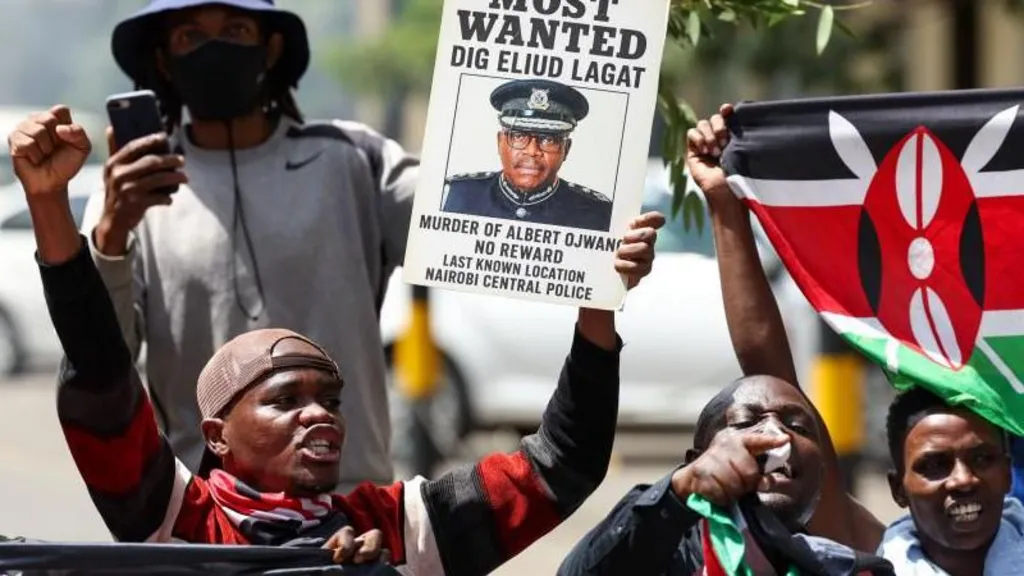Nairobi, Kenya – Deputy Police Chief Eliud Lagat has stepped aside pending the outcome of an investigation into the controversial death of Kenyan blogger Albert Ozwang, who died while in police custody. The move follows mounting pressure from human rights organizations, opposition leaders, and the public, all demanding justice and accountability for the 31-year-old’s tragic demise.
Blogger’s Arrest Sparks National Outrage
Albert Ozwang, a well-known digital activist, was arrested after filing a defamation complaint against Mr. Lagat, allegedly following an ongoing public dispute between the two. Police initially claimed Ozwang died by suicide, having inflicted injuries on himself. However, an autopsy report contradicted those findings, revealing signs consistent with assault injuries rather than self-harm.
This revelation led to a national uproar and prompted Kenya’s Independent Policing Oversight Authority (IPOA) to launch an urgent investigation.
Eliud Lagat Steps Aside to ‘Support Transparency’
In response to the escalating backlash, Deputy Chief Lagat issued a public statement denying involvement but acknowledging the need for a transparent process. “I am stepping aside voluntarily to allow for an impartial investigation,” he said. “I send my deepest condolences to Albert’s family.”
Until the inquiry concludes, Lagat will not perform his official duties. His deputy has assumed his responsibilities temporarily.
A Death That Shocked a Nation
Albert Ozwang was arrested from his hometown, Kakotha Village, near Homa Bay, and transferred to a police facility in Nairobi. Days later, he was found unconscious in his cell. Police originally reported that he had repeatedly struck his head against a wall, leading to fatal injuries. But the autopsy confirmed blunt force trauma, suggesting he was attacked while in custody.
Following these findings, Chief of Police Douglas Kanja apologized to the public for the “misinformation” in the initial reports, blaming inaccurate statements from junior officers. He assured the nation of a “thorough, independent, and fair investigation.”
Arrests and Allegations of a Cover-Up
Several officers, including the head of the police station, a subordinate, and a technician, have been detained. Authorities suspect that CCTV footage may have been tampered with or deleted, raising serious concerns about a potential cover-up.
Human rights watchdogs are calling for criminal prosecutions and systemic reforms, citing at least 20 deaths in police custody in the past four months alone. According to the Kenya Human Rights Commission (KHRC), over 160 cases of police misconduct were reported last year, underscoring what critics call a deep-rooted culture of impunity.
President Ruto and Opposition Weigh In
President William Ruto met personally with Albert’s father, Meshack Opio, to offer condolences and pledged 2 million Kenyan shillings (approximately $15,500) toward funeral expenses. Opposition leader Raila Odinga also expressed support and offered half that amount to assist the grieving family.
“This isn’t just about one man’s death,” said Odinga. “It’s about the safety of all Kenyans. Police brutality cannot be tolerated in a modern, democratic society.”
A Call for Reform and Accountability
Albert Ozwang’s death has become a rallying point for police reform in Kenya. Rights groups, politicians, and ordinary citizens are calling for swift justice and major structural changes to the nation’s law enforcement agencies.
The IPOA has reaffirmed its commitment to investigating misconduct and ensuring that officers found guilty of abuse face prosecution and dismissal. The incident has reignited conversations about the need for body cameras, secure detainee rights, and oversight of detention facilities.
A Life Cut Short, a Legacy of Advocacy
Friends and followers remember Ozwang as a fearless voice against corruption and oppression. His work focused on transparency, civic education, and accountability in public institutions. His tragic death, now under international scrutiny, has amplified the very cause he fought for.
As Kenya continues to grapple with this devastating loss, Ozwang’s family remains steadfast in their pursuit of justice. “Albert spoke truth to power,” said his father, Meshack Opio. “Now we ask that truth brings him justice.”
Conclusion: A Moment for Change
The death of Albert Ozwang is a painful reminder of the urgent need for reform in Kenya’s law enforcement system. As investigations unfold, all eyes remain on the Kenyan government’s response to ensure justice is served. Albert’s memory, already a symbol of resistance and truth, continues to shine as a beacon for those demanding a safer, fairer Kenya.

